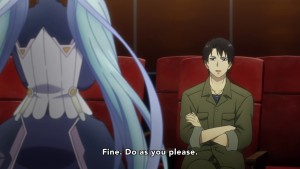 Planetarian is one of those quietly powerful little stories that come along every so often whose simplicity belies their depth of feeling. I totally get why Visual Arts fans have raved about this story for all these years, because it seems to be a kind of perfect storm of emotional impact – a very elemental premise that hits exactly the right notes. It’s also quite unlike anything else in the Key catalogue, at least anything else I’ve seen.
Planetarian is one of those quietly powerful little stories that come along every so often whose simplicity belies their depth of feeling. I totally get why Visual Arts fans have raved about this story for all these years, because it seems to be a kind of perfect storm of emotional impact – a very elemental premise that hits exactly the right notes. It’s also quite unlike anything else in the Key catalogue, at least anything else I’ve seen.
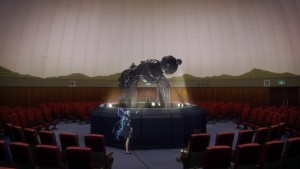 David Productions’ treatment of Planetarian is quite befitting, because it’s properly straightforward and simple. It just presents the material more or less at face value without a lot of fussiness or flash. It doesn’t require a big push on my part either, because it speaks for itself far better than I can speak for it. An episode like this is a collection of moments: Kuzuya tucking his cookies away rather than defy Yumemi’s instructions. Miss Jena “bowing” before the projection begins. Yumemi’s line deliveries, so earnest and lacking in pretext (and given their hokiness, I don’t know that a human could pull that off). These moments together comprise a feeling – the feeling we get in watching these two characters interact in a bubble of serenity in a dying world.
David Productions’ treatment of Planetarian is quite befitting, because it’s properly straightforward and simple. It just presents the material more or less at face value without a lot of fussiness or flash. It doesn’t require a big push on my part either, because it speaks for itself far better than I can speak for it. An episode like this is a collection of moments: Kuzuya tucking his cookies away rather than defy Yumemi’s instructions. Miss Jena “bowing” before the projection begins. Yumemi’s line deliveries, so earnest and lacking in pretext (and given their hokiness, I don’t know that a human could pull that off). These moments together comprise a feeling – the feeling we get in watching these two characters interact in a bubble of serenity in a dying world.
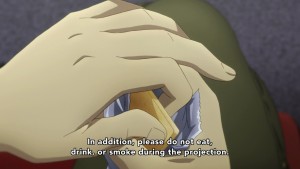 The projection itself was actually quite beautiful – all the more so because it’s the kind of cornball presentation the Japanese seem to love in settings like this. There’s an innocence to it, just as there is to Yumemi herself – and that’s surely what fascinates Kuzuya so much, because if anything had seemingly passed from the Earth in the world he inhabits it would be innocence. What possible logical reason could there be for a man in his position not just to fix Miss Jena, but then to tell Yumemi to finish the projection using the power of her own voice alone after the literal power runs out? The answer, of course, is none at all – but what separates existence from living is that which goes beyond logic. And as long as a man is alive, no matter how hopeless his environment, surely there’s a part of him that longs to live rather than merely exist.
The projection itself was actually quite beautiful – all the more so because it’s the kind of cornball presentation the Japanese seem to love in settings like this. There’s an innocence to it, just as there is to Yumemi herself – and that’s surely what fascinates Kuzuya so much, because if anything had seemingly passed from the Earth in the world he inhabits it would be innocence. What possible logical reason could there be for a man in his position not just to fix Miss Jena, but then to tell Yumemi to finish the projection using the power of her own voice alone after the literal power runs out? The answer, of course, is none at all – but what separates existence from living is that which goes beyond logic. And as long as a man is alive, no matter how hopeless his environment, surely there’s a part of him that longs to live rather than merely exist.


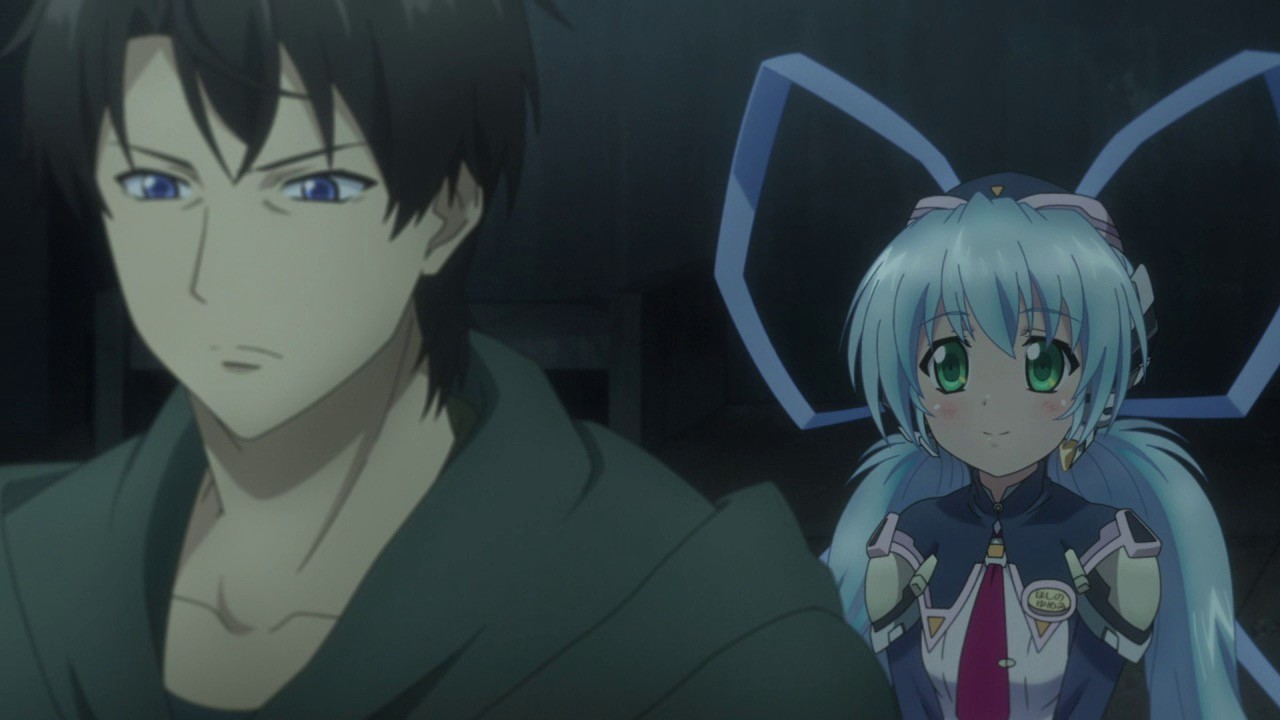
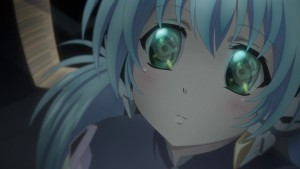

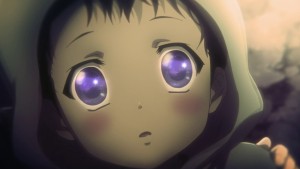
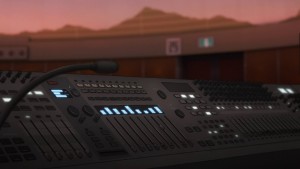
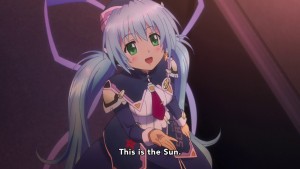
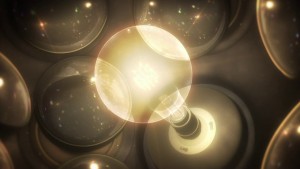
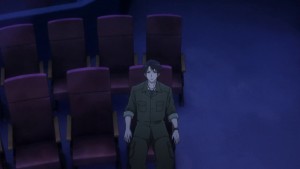
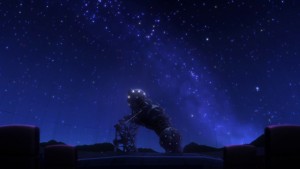
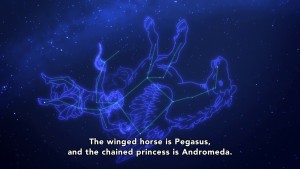
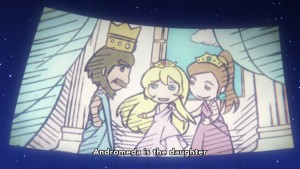
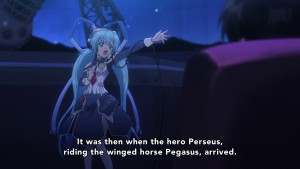
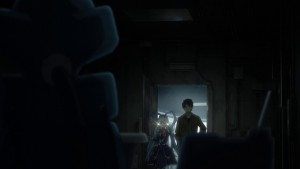
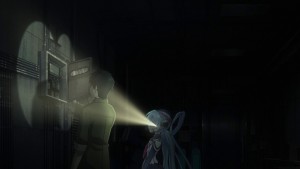
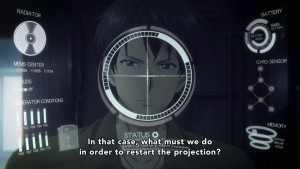
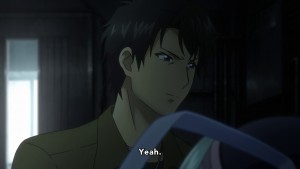
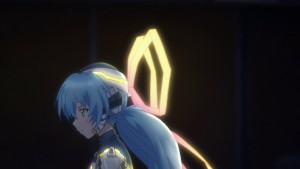



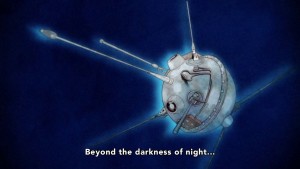
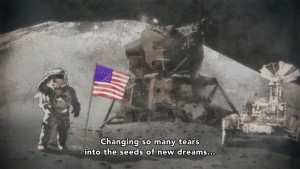
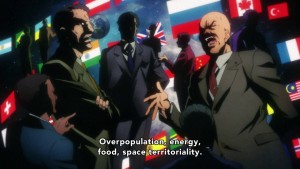
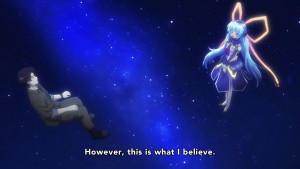
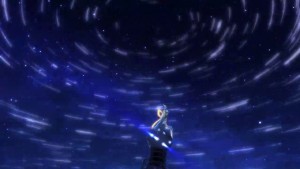
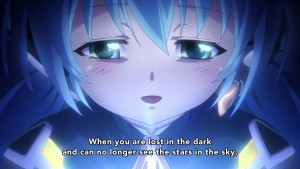
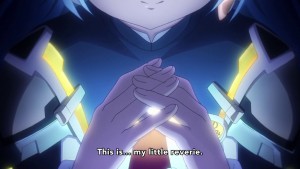
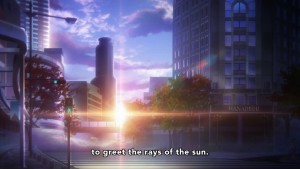

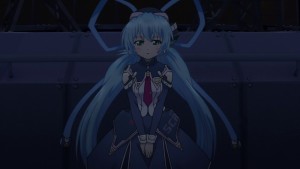




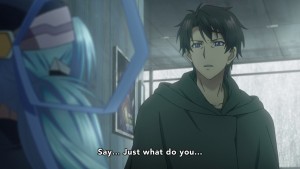


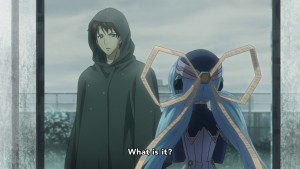
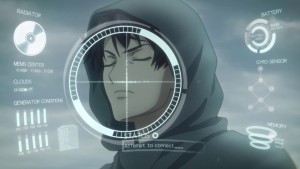



Flower
July 23, 2016 at 9:56 amAnother good post. Hmm … it is such a shame (and perhaps a testament to the power of the simplicity of this series’ presentation thus far?) that so little has come out in the online discussions I have been exposed to thus far. If it were not for it being blogged in a few places I wonder if there would be any depth of discussion and reflection at all? Fortunately there is some out there, though, so thanks for tackling this series as well.
It has also been interesting to see how differently others have processed the series as well. One example that comes to mind is how blogger of this series mentioned that one might suspect that the reason for Yumemi’s optimism could lay in her malfunctions. To be honest that never crossed my mind … I wonder if their saying this like that was in a semi-poetic way? Part of me just assumed that her presentation was, after all, largely simply due to her programming – she was programmed to present things like that, with that “overarching theme” of optimism. I also chalked her presentation of the stories and dreams she had to this as well.
One of my favorite themes of science fiction (that you touch on in this post) is probing into that blurry line of … human consciousness, personality and self-awareness it’s authors often present between the organic and the inorganic – between creator and created. There is a certain inexplicable, mysterious “something” that appears to happen with some robots in these stories that enables, permits, allows, births, whatever said creation to suddenly cross over that misty border somehow (or seems to in some ways) and exhibit either some of completely human-like qualities. Sometimes the emphasis is on pushing the limits between the edges of the boundary (on either side) and by doing so bring into the foreground some of the aspects of what makes a human a human as well.
As far (though some may disagree) as I can tell thus far the way Yumemi has been presented has done just this – it has kept her squarely within the realm of a machine, while emphasizing a pushing against the edge of the brink in her actions and manner of speech that contrast the “dehumanized” state of the dystopian world the Junker finds himself in and has been formed by to a degree – and that contrast of her programmed behavior and the words of her presentation make us ruminate on things about ourselves and our lives as well. For me this is a strength of the manner of the presentation itself and makes the story all the more engaging and even powerful.
But obviously not everyone has felt similarly about it….
NoSicko
July 25, 2016 at 12:16 pmIMO, some of the things Yumemi is doing weren’t programmed into her. She basically lied to the Junker when they first met, she expressed the desire to dream and shed tears, and she asked her creators if there was a heaven for robots.
Whether it’s her “malfuntions” or Key’s mystical additions that are causing it, I don’t know.